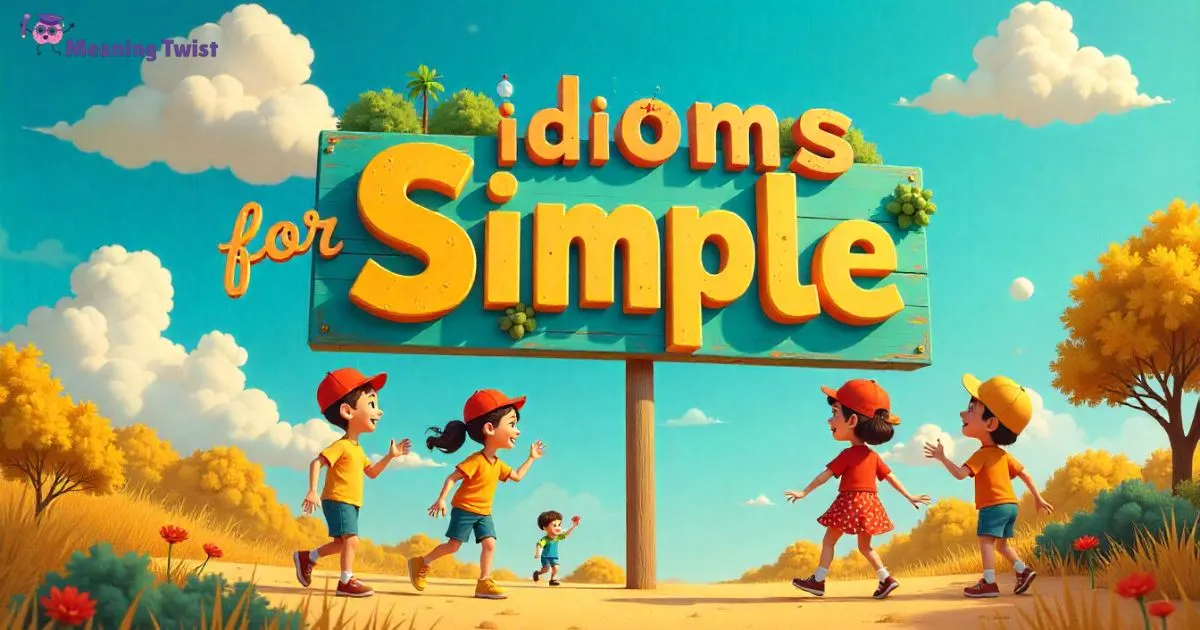Life often feels like a never-ending puzzle of ideas, decisions, and reflections. Whether you’re trying to make a tough choice, come up with a creative solution, or just understand your own feelings, thinking is what keeps everything in motion. But instead of saying “I’m thinking,” again and again, imagine using colorful idioms for thinking — expressions that add depth, wit, and personality to your words.
These idioms make your conversations sound more natural and engaging, whether you’re chatting with friends, writing online, or presenting an idea at work. So why stick to plain talk when you can use something that truly shows how your mind works? Try a few — they’ll instantly make your speech smarter, expressive, and memorable.
Using idioms for thinking is not just about sounding fluent — it’s about connecting. When you say “Let me sleep on it” or “It’s food for thought,” people feel your process. They sense curiosity, doubt, or inspiration. And that’s what great communication is all about — turning your thoughts into relatable, human stories.
1. Food for Thought
Meaning: Something that makes you think deeply or reflect on an idea.
Scenario: After a discussion, you realize a point worth considering.
Tip: Use when someone shares a thought-provoking idea.
Real-life Example: That documentary about climate change really gave me food for thought. I didn’t realize how small daily habits could have such a big global impact. It’s been on my mind all day, making me rethink my own lifestyle.
2. Rack Your Brains
Meaning: To try very hard to remember or think of something.
Scenario: You’re trying to recall a name or solve a problem.
Tip: Perfect when struggling to remember something.
Real-life Example: I’ve been racking my brains all morning trying to remember where I left my house keys. I’ve checked every drawer, every pocket — still nothing!
3. A Penny for Your Thoughts
Meaning: Used to ask someone what they’re thinking about.
Scenario: When a friend seems lost in thought.
Tip: Great for gently starting a conversation.
Real-life Example: You’ve been quiet for a while, just staring at the window. A penny for your thoughts? You must be thinking about something serious.
4. Think Outside the Box
Meaning: To come up with creative or unconventional ideas.
Scenario: Solving a tricky problem at work or school.
Tip: Use when encouraging innovative thinking.
Real-life Example: Our team had to think outside the box to design an ad campaign that truly stood out from the competition — and it worked beautifully!
5. Cross Your Mind
Meaning: When a thought suddenly appears or occurs to you.
Scenario: Remembering someone unexpectedly.
Tip: Use for spontaneous or passing thoughts.
Real-life Example: It just crossed my mind to call Sarah — I haven’t talked to her in months, and suddenly I missed her voice.
6. Lose Your Train of Thought
Meaning: To forget what you were saying or thinking.
Scenario: Getting distracted mid-sentence.
Tip: Use when conversation flow breaks.
Real-life Example: I was about to tell you something important, but I completely lost my train of thought when the phone rang.
7. Weigh Your Options
Meaning: To carefully consider different choices before deciding.
Scenario: Choosing between two career paths.
Tip: Use for decision-making moments.
Real-life Example: Before accepting the job offer, I need to weigh my options — more pay sounds great, but I’ll miss the flexible hours of my current role.
8. On Second Thought
Meaning: Reconsidering or changing your mind after initial thinking.
Scenario: Rethinking a decision.
Tip: Great for moments of reflection.
Real-life Example: I was about to buy that expensive phone, but on second thought, my current one works perfectly fine.
9. Off the Top of My Head
Meaning: Saying something without checking facts or thinking deeply.
Scenario: Answering a question quickly.
Tip: Use when sharing spontaneous ideas.
Real-life Example: Off the top of my head, I’d say there are around 50 guests, but I’ll confirm once I check the list.
10. Mull It Over
Meaning: To think about something carefully for some time.
Scenario: Considering a big life decision.
Tip: Use for thoughtful reflection.
Real-life Example: When he offered me the business partnership, I told him I’d need to mull it over before making such a big commitment.
11. A Lot on My Mind
Meaning: When you’re thinking or worrying about many things.
Scenario: Feeling mentally overloaded.
Tip: Use when stressed or distracted.
Real-life Example: Sorry I’ve been distant lately — I’ve just had a lot on my mind with work and family stuff piling up.
12. Think Twice
Meaning: To reconsider something before doing it.
Scenario: Before taking a risky decision.
Tip: Use for warning or advice.
Real-life Example: You should think twice before lending him money again; he’s not the most reliable person.
13. Put Your Thinking Cap On
Meaning: To start thinking seriously about a problem.
Scenario: During brainstorming sessions.
Tip: Great for group discussions.
Real-life Example: Alright team, we need to come up with a new slogan — time to put your thinking caps on and get creative!
14. Have Second Thoughts
Meaning: To start doubting a previous decision.
Scenario: Rethinking after committing.
Tip: Use for uncertainty.
Real-life Example: I signed up for the marathon, but now I’m having second thoughts about running 42 kilometers in the heat.
15. Clear Your Head
Meaning: To take a break to stop overthinking or relieve stress.
Scenario: After working for hours.
Tip: Use for mental clarity moments.
Real-life Example: I went for a long walk in the park to clear my head before finishing the report.
16. Think on Your Feet
Meaning: To respond quickly and effectively without preparation.
Scenario: Answering questions during an interview.
Tip: Use for spontaneous decision-making.
Real-life Example: During the presentation, one of the clients asked a tricky question, and I had to think on my feet to come up with a good answer.
17. Food for the Brain
Meaning: Something intellectually stimulating or educational.
Scenario: Reading or attending lectures.
Tip: Use for smart, thought-provoking content.
Real-life Example: That podcast was pure food for the brain — I learned more in 30 minutes than I did all week.
18. Think Something Through
Meaning: To consider all details carefully before acting.
Scenario: Planning a project or major move.
Tip: Use for logical thinking processes.
Real-life Example: Before launching our new product, we need to think it through — every small mistake could cost us time and money.
19. Mind Goes Blank
Meaning: Suddenly unable to think or remember anything.
Scenario: Forgetting during a test or speech.
Tip: Use for nervous moments.
Real-life Example: When I got on stage, my mind went blank — I forgot every single line I had memorized.
20. Split Hairs
Meaning: To argue about small, unimportant details.
Scenario: During discussions or debates.
Tip: Use when someone is being overly precise.
Real-life Example: We’ve agreed on the main idea, so let’s not split hairs over minor points.
21. Change Your Mind
Meaning: To decide differently from what you originally thought.
Scenario: Altering a plan.
Tip: Common and simple idiom for everyday use.
Real-life Example: I was going to stay home tonight, but I changed my mind and decided to go out with friends.
22. Brainstorm
Meaning: To generate multiple ideas quickly.
Scenario: Team discussions or creative sessions.
Tip: Use for idea-generation moments.
Real-life Example: We spent the whole afternoon brainstorming new marketing strategies, and some of them turned out brilliant!
23. It Slipped My Mind
Meaning: To forget something unintentionally.
Scenario: Forgetting an appointment or task.
Tip: Use for small forgetful moments.
Real-life Example: I’m so sorry — your birthday completely slipped my mind this week! Let’s celebrate tomorrow.
24. Overthink
Meaning: To think too much about something.
Scenario: Worrying about small issues.
Tip: Use for stress-related thoughts.
Real-life Example: I tend to overthink every text I send — sometimes I just need to relax and go with the flow.
25. Think Big
Meaning: To aim high and have ambitious ideas.
Scenario: Setting goals or dreaming big.
Tip: Use for motivation or encouragement.
Real-life Example: If you want to build something truly amazing, you’ve got to think big — don’t limit yourself!
26. Sleep On It
Meaning: To delay making a decision until the next day.
Scenario: Considering a proposal or offer.
Tip: Use for decisions that need more thought.
Real-life Example: I’m not sure if I should accept the deal — I’ll sleep on it and let you know tomorrow.
27. Turn It Over in Your Mind
Meaning: To keep thinking deeply about something.
Scenario: Reflecting on a conversation.
Tip: Use for introspective thoughts.
Real-life Example: I kept turning her words over in my mind all night, wondering if she was right about me needing a change.
28. Jump to Conclusions
Meaning: To make a decision without enough information.
Scenario: Misunderstanding someone’s actions.
Tip: Use for assumptions or quick judgments.
Real-life Example: Don’t jump to conclusions — there might be a perfectly good explanation for what happened.
29. Have a Brainwave
Meaning: A sudden brilliant idea.
Scenario: When creativity strikes unexpectedly.
Tip: Use when describing eureka moments.
Real-life Example: While showering, I had a brainwave about how to redesign our website for better engagement.
30. Think the World Of Someone
Meaning: To admire or respect someone deeply.
Scenario: Talking about someone you value.
Tip: Use for expressing positive thoughts.
Real-life Example: I think the world of my mentor — she’s been my biggest inspiration through every stage of my career.
Key Insight about Idioms for Thinking
1. What’s a common idiom to describe deep thought?
Try “mull it over” or “turn it over in your mind.” They both show serious reflection.
2. How can I describe forgetfulness naturally?
Use “It slipped my mind” or “My mind went blank.” Both are casual and expressive.
3. Which idiom shows creativity?
“Think outside the box” or “Have a brainwave” perfectly describe moments of innovation.
4. What idiom means to make a decision later?
Say “Sleep on it.” It’s friendly and fits real-life decision-making.
5. How can I describe someone overanalyzing?
Use “Overthink.” It’s simple, modern, and fits everyday situations perfectly.
Conclusion
Thinking is what shapes who we are — our choices, dreams, and connections. And with idioms for thinking, you can express all that beautifully. These phrases make your speech more expressive, human, and vivid. Whether you’re mulling something over, thinking outside the box, or having second thoughts, each idiom adds color to your language.
They help turn everyday thoughts into stories worth sharing. So next time you’re lost in thought, don’t just say “I’m thinking.” Use these idioms to express your ideas naturally and creatively. Because when your words reflect your mind, your conversations truly come alive. 💭✨

Hi, I am Joey, the admin of meaningtwist.com. I simplify deep meanings and twist ordinary words into extraordinary insights to spark your curiosity and clicks!




